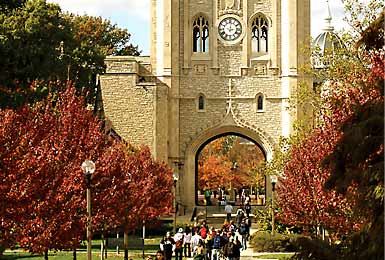Higher Education and Business: An Alchemy for Growth
In today's challenging economic climate, industry and academia can no longer afford to work independently of each other.
2011 Directory

One could argue that innovation and creativity have always been the economic engines. But in the not so distant past, it was the individual innovators and creative stars - the Thomas Edisons and Henry Fords - who moved society forward, often without much more than their intellect and determination to guide them.
Those stars still emerge today, but more often than not, they emerge from America's crucibles of innovation and creativity, its colleges and universities. The United States spends more than any other nation on its educational infrastructure - at least 7 percent of GDP, by one estimate - or over a trillion dollars annually to impart knowledge and generate research. Are we getting our money's worth?
Instruments of Economic Development
The "academy" has been a feature of civilization well into pre-history. It has been the place for young minds to be exercised and to contemplate humanity's origins and the human condition. Only recently though, within the last couple of centuries, have universities been viewed as instruments of economic growth or development. Land grant universities, in particular, were established by states to improve agricultural practices and spread the benefits of higher education beyond a small group of well-heeled individuals.
With the economy sputtering, many are asking if that trillion-dollar investment in education is yielding the jobs and quality of life conventional wisdom suggests it should. One of them is Ohio State University (OSU) President E. Gordon Gee. "My viewpoint is perhaps not that of the standard U.S. university president. Our colleges and universities are largely hidebound, tied to fixed canon, and - superb as they are - frustratingly slow to adapt," Gee says.
"To thrive in the 21st century," Gee told the American Chamber of Commerce in Shanghai, China, last fall, "universities and businesses alike must cast off Jurassic thinking, seek calculated risks, and reach out aggressively to one another in partnership. In this accelerated era, tried-and-true conventional approaches will doom us to extinction."
Championing Tech Transfer
President Gee may not be alone in this thinking. Increasingly, across the country, states and their universities are looking for ways to improve tech transfer - the movement of good ideas off campus and into income-producing and job-generating enterprises. Reston, Virginia's Innovation Associates (www.innovationassoc.com) has been particularly concerned with the process, producing a series of reports in recent years with titles such as "Accelerating Economic Development Through University Technology Transfer" and "Technology Transfer and Commercialization Partnerships."
The reports find that "champions" are critical in creating technology-based economic development. Often, says Innovation Associates' 2005 report, these champions are strong university presidents or chancellors who infuse their schools with an entrepreneurial culture. That may mean providing rewards and incentives for faculty to pursue tech transfer and commercialization, or hiring individuals with industry and entrepreneurial experience.
Ohio State's Gee is one such "champion." He's recently hired a Johnson and Johnson executive, Christine Poon, to head Ohio State's Fisher College of Business and direct OSU's tech-transfer process. He's also chosen a CFO from J.P. Morgan Chase, Geoff Chatas, and a 30-year tech industry executive, Dr. Sharell Mikesell, to head the university's Industry Liaison Office - more about this later.
Project Announcements
Spartan Composites Plans Saltillo, Mississippi, Manufacturing Operations
02/14/2026
Hydrite Purchases Plans Laurens, South Carolina, Operations
02/13/2026
Blue Pony Energy Plans Lovington, New Mexico, Synthetic Fuel Operations
02/13/2026
James Composites Plans Marshall County. Kentucky, Manufacturing Operations
02/13/2026
Joby Aviation Plans Vandalia, Ohio, Operations
02/09/2026
Siemens Energy Plans Fort Payne, Alabama, Manufacturing Operations
02/09/2026
Most Read
-
Top States for Doing Business in 2024: A Continued Legacy of Excellence
Q3 2024
-
Data Centers in 2025: When Power Became the Gatekeeper
Q4 2025
-
Speed Built In—The Real Differentiator for 2026 Site Selection Projects
Q1 2026
-
Preparing for the Next USMCA Shake-Up
Q4 2025
-
Tariff Shockwaves Hit the Industrial Sector
Q4 2025
-
The New Industrial Revolution in Biotech
Q4 2025
-
Strategic Industries at the Crossroads: Defense, Aerospace, and Maritime Enter 2026
Q1 2026


